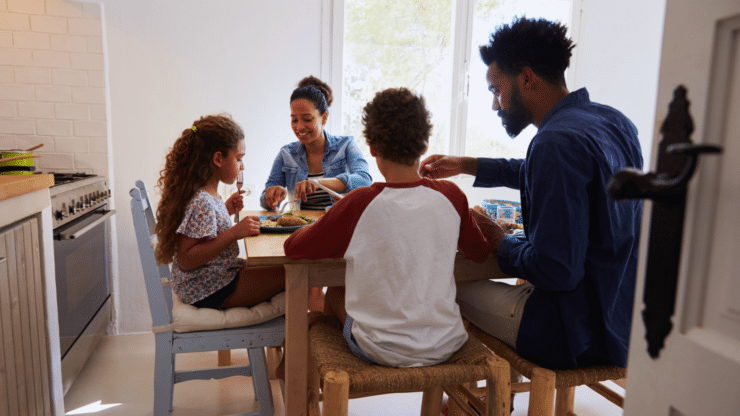It’s easy to overlook the importance of everyday things like eating a regular meal with your family.
These days 68% of American adults prefer to eat alone, but eating has always been a very social ritual, with cultures worldwide having important festivals, holidays, and customs centered around eating together.
In the U.S., we have big family dinners for Thanksgiving and Christmas. Why do you think that is? It’s not just because we love mashed potatoes. We’re social animals, and these feasts make us feel close to others. We gain a sense of belonging from these holiday meals.
Family Meals Improve Communication
When you’re eating as a family, you’re talking to each other, sharing ideas, laughing, and learning more about each other.
Mealtime is an excellent opportunity to ask your child about their day and encourage them to share their thoughts and opinions.
Your children are also learning more about you. If you work all day, your child probably has no idea what you do outside of the house. Talk about work (but don’t bore them to death) and share your own age-appropriate thoughts and opinions with them.
This dialogue creates trust and deepens your relationship.
Even the moodiest teenager will be more likely to open up to you if you’ve established that good communication pattern earlier in life.
If you see your child at the dinner table every night, you’ll get a sense of their personality, typical moods, and behaviors, which will help you quickly detect if something is wrong.
Respecting Picky Eaters
I’m very much against forcing kids to eat anything they don’t want to eat. Toddlers might seem like they’re being super picky just to mess with your head, but a lot of the time, it’s because they’re very sensitive to textures, smells, and flavors. They can also have undiagnosed food allergies.
If your child doesn’t want to eat something, you should respect that. Of course, that doesn’t mean putting your little one on an all-candy diet. It means you must try different food and techniques to get your child to eat.

It’s often easier for younger kids to eat if their family is eating with them because they learn by copying. They’ll see parents or siblings enjoying food, making them more willing to give it a shot.
A great way to encourage picky kids to eat is by introducing them to different food. Put that food on your plate first and have them see you eat it and enjoy it. Then, you can offer that food to your picky one and see if they want to try it. If you’re not eating with your child, it will be harder to encourage them to eat something other than white bread with the crusts cut off if that’s all they want to eat right now.
ALSO: Should Restaurants Ban Kids Under 10?
Ditch the Screens at Dinner
When eating as a family, consider having a “no devices” rule to lessen your family’s screen time, improve your communication, and improve your family’s health.
When kids and adults are distracted by an iPad or TV while eating, they can overeat, eat too fast, or not chew their food correctly—eating slowly, eating the right amount, and chewing your food are vital for good gut health and digestion. The habits your kids form early on in life will continue to be their habits later in life, so it’s important to start strong.

I grew up eating while watching TV as a kid, and even now, a few decades later, I’m still reminding myself not to eat while watching YouTube or Ru Paul’s Drag Race. I only taste my meals when I’m focused and want to be present and enjoy my food, not just mindlessly shoveling food.
Establishing Table Manners
Eating together as a family also teaches your child proper table manners, which is helpful at school, when eating with other people, and when you go to restaurants.
Toddlers can and should be encouraged to sit, eat, and feed themselves.
When I taught toddlers, many of them came from wealthy families and were used to their nannies feeding them in front of the TV. Even the ones who didn’t have a nanny catering to them 24/7 were not encouraged to sit down to eat during meals and were chased around the room with a spoon of food by a stressed-out parent.
ALSO: Should Parents Allow Teens to Drink at Home?
Even though half of my toddler students did not know how to sit and eat when they started school, they learned quickly, especially from the other students who did know how. The kids who could not sit down to eat did not eat well, affecting their overall mood at school and home.
Family Meals Boost Bonding
Once all my students were settled and eating together for snack time and lunchtime, they were happier, ate well, and their bonds with each other became more robust because they talked to each other during these meal times and made each other laugh.
The kids also improved their fine motor skills and hand-eye coordination since they were feeding themselves.
I often ate with my students to model good eating habits and bond with them. Since my students spent most of the day in different centers, eating with them allowed me to check in with each of them and see how they were doing. I also noticed if something was wrong if their appetite changed, and I could talk to their parents about it later on.
ALSO: Parenting Style — Are You Authoritative, Permissive, or Authoritarian?
Even if you’re not talking and just enjoying food together, you’re still spending time being close to your family. Physical closeness with a loved one can be just as important as talking to them.
Encouraging your family to help you cook and set the table is also a good way to bond and teach your child about responsibility and taking care of others. This will improve their confidence and communication.
Younger kids love to do chores and cook. They’ll be more than happy to help you mix food or set the table and will enjoy that close bonding time with you.
If you can’t schedule to plan family meals every day, weekend family meals are great too. You can do “Pizza Saturdays” or “Pancake Sundays,” where your family helps you cook and serve their favorite food.
If you do it right and make it a fun and enjoyable experience, those family meals will become some of your child’s fondest memories when they grow up.










Add comment